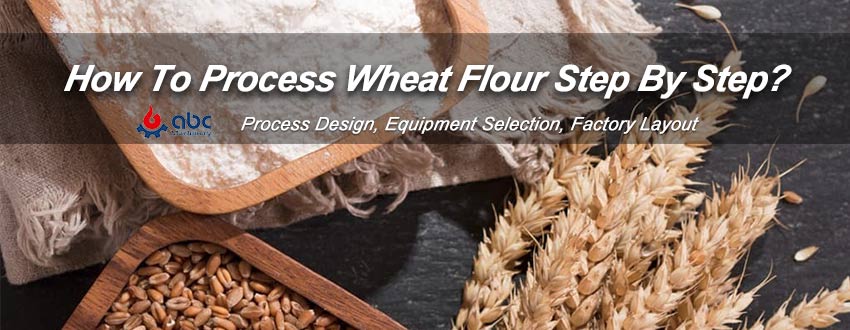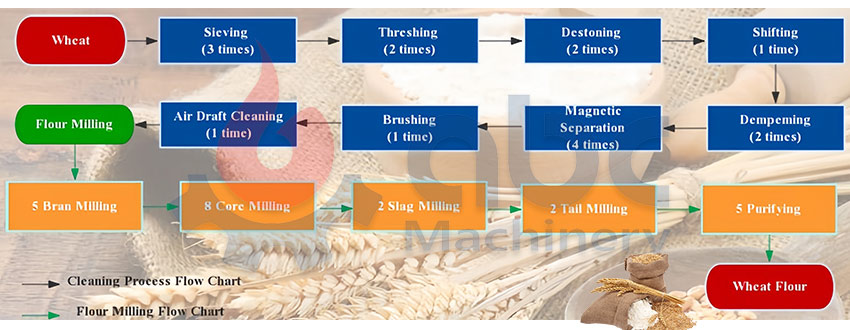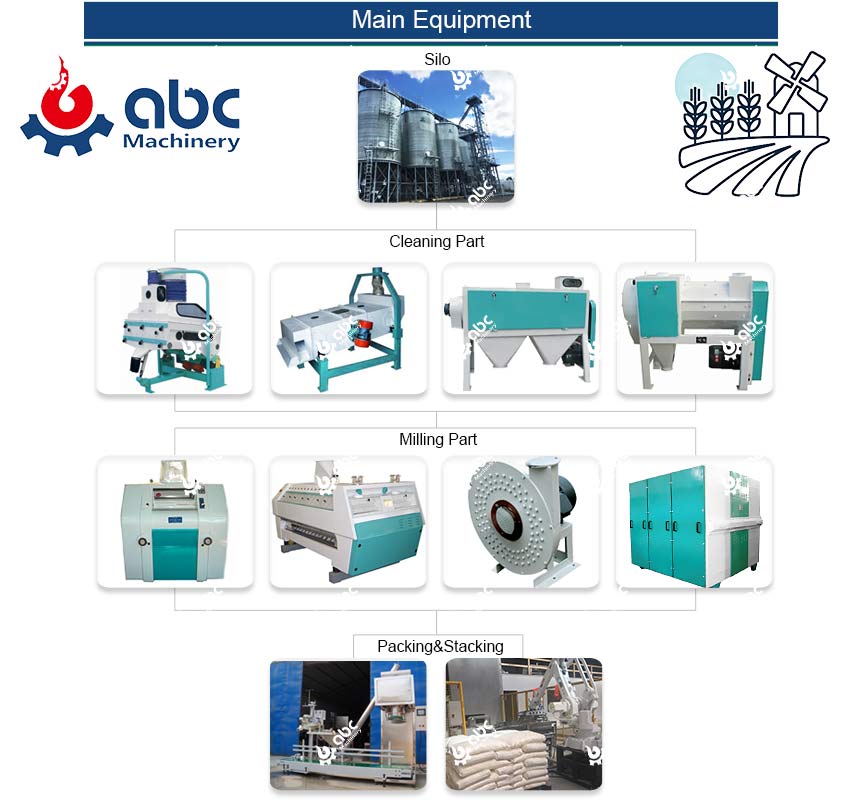Essential Wheat Processing Steps: Flour Production Guide
Wheat is a staple crop that has been cultivated for thousands of years and is an important part of diets around the world. In 2023, global wheat production reached a record 800.2 million tons, underscoring the critical role of wheat in food. However, for those new to the flour milling industry and eager to capitalize on the opportunity to start wheat flour production business plan, a key question is: how is wheat flour produced? What follows is an article that explores the general process of making wheat flour and provides every investor with insights into the various stages of flour milling.

How is Wheat Flour Made Step by Step?
Wheat Processing Steps in Commercial Flour Mills
Wheat to flour process generally contains two steps: Wheat Cleaning Process and Wheat Milling Process. A variety of wheat cleaning equipment (such as the first clearing, gross wheat cleanup, wet wheat, net wheat, etc.) reasonably combined together, constituting the wheat seed cleaning process, known as wheat road. The entire process of wheat milling is formed by grinding, flour cleaning, and bran beating of cleaned wheat, which is called flour road. In commercial flour mills, main wheat flour processing steps are processed into finished flour through wheat road and flour road, and finally packaged for sale in the flour market.

Process of Wheat Milling Flow Chart
If you would like to learn more about the wheat flour manufacturing process or get a detailed wheat flour production process pdf, click the button below to get it for free.
Wheat Cleaning Process: Pre-Processing Steps for Flour Making Process
Preparation of wheat before milling is mainly about cleaning impurities and moisture adjustment. The wheat cleaning process is to clean wheat for milling, which can ensure in the subsequent wheat processing steps can proceed smoothly.
- Wheat Cleaning
Wheat is usually harvested with many impurities such as soil, stones, plant debris and other grains. These impurities not only affect the quality of flour, but also may cause damage to the wheat processing equipment. Therefore, cleaning the wheat is an essential step in the process of milling wheat before the flour is officially processed.
- Wheat Conditioning
The moisture content of wheat is one of the key factors affecting its processing quality. Proper moisture regulation can increase milling efficiency of wheat flour milling machines, improve flour quality, and extend the shelf life of flour. Too much or too little moisture can adversely affect the process and the final product. The moisture content of wheat after wheat conditioning process is 14%~15.5% is optimal.
Wheat Processing Equipment Used in Wheat Cleaning Process
| Classification | Wheat Processing Machines | Function |
|---|---|---|
| Wheat Cleaning Equipment | Vibrating screen | Remove large impurities such as stones, plant fragments |
| Magnetic separator | Remove ferromagnetic impurities such as iron filings, nails, etc. | |
| De-stoning machines | Remove of stones and mud | |
| Conditioning scouring | Remove impurities, surface contaminants and some bran | |
| Wheat Tempering Equipment | Conditioner machines | Regulate wheat moisture and temperature to improve flour yield |
Wheat Flour Milling Process: Quality Production in Flour Production Lines
The initial stage of wheat milling, known as grinding, involves breaking down the wheat kernels into smaller particles. The wheat grinding process is crucial as it determines the texture and quality of the flour. Advanced wheat grinding machinery and technology play a significant role in this phase, ensuring precision and consistency. Following grinding, the process of sifting separates the fine flour from the bran and other coarse particles. This step is essential for achieving the desired flour consistency and removing impurities that might affect the quality of the final product.
- Wheat Milling
After wheat tempering is completed, wheat enters the flour milling machine, where it is gradually ground into a fine powder by the combined action of multiple grinding rollers and screens. The wheat flour milling process is usually divided into several stages, each of which uses different rollers and screens to ensure that the quality and fineness of the wheat flour reaches the required level. (Link to How to Buy Wheat Mill Machine at Low Cost>>)
Specific grinding stages of commercial flour mill usually include:
- Coarse Milling Stage
In the coarse milling stage, wheat kernels are initially ground by coarse milling rollers. The purpose is to break open the wheat kernels, release the endosperm, and separate most of the bran. The product of coarse milling is a coarse meal, containing larger particles and some bran.
- Intermediate Milling Stage
The intermediate milling stage further grinds the product from the coarse milling stage. Intermediate rollers refine the larger particles in the coarse meal and continue to separate the bran from the endosperm.
- Fine Milling Stage
The fine milling stage further refines the intermediate milled product. Fine milling rollers and fine sieves are used in combination to grind the product into very fine particles, approaching the requirements for finished flour.
- Final Milling Stage
The final milling stage involves the last grinding and sifting of the product. It uses finer rollers and sieves to ensure the powder is uniformly fine, removing the last bits of bran and impurities, thereby achieving the highest purity and quality of flour.
- Wheat Sifting and Purification
It is the process of further purification of wheat flour after milling. Impurities such as bran, endosperm fragments, etc. may be mixed with the powder produced during the wheat flour grinding process. Through the flour cleaning equipment, these impurities are effectively separated out. The effect of flour purification directly affects the color and taste of the flour, so the flour sifting and purification process is crucial and often needs to be repeated many times.
Wheat Flour Processing Equipment Used in Wheat Milling Process
| Classification | Wheat Processing Machines | Function |
|---|---|---|
| Wheat Milling Equipment | Roller Flour Grinding Machine | Grind wheat kernels by the relative rotation of two rollers. |
| Wheat Flour Purification Equipment | Sieves and Sifters | Separate flour from the impurities by sieve screen |
| Flour purifier | Remove bran and impurities by a combination of sieving and air suction. |
Flour Packaging and Storage: Ensuring Longevity in Wheat Processing Plants
After wheat flour is processed, it needs to be packaged and then stored. This process usually uses an automatic wheat flour packaging machine. When storing wheat flour, the temperature should be controlled at 10-20 °C, relative humidity below 60%, keep the storage environment dry and ventilated, and avoid direct sunlight.
Buy Wheat Processing Machine for Flour Milling Process Steps
Modern flour mills use a range of complex and elaborate wheat processing equipment in the production of wheat flour. I have briefly mentioned some equipment in the table above. However, the process of flour production is notable for its complexity and finesse, and different flour processing plants will choose the appropriate process for their specific circumstances. These circumstances include the scale of production, the quality requirements of the finished flour, the target market, and so on.
Although the wheat flour manufacturing process may vary slightly from plant to plant, the basic wheat processing steps are the same, so there are still some common equipment to consider when buying wheat flour making machines. Choosing the right flour processing machine is the key to ensuring production efficiency and product quality. Here are some of the flour processing machinery that ABC Machinery recommends for a complete wheat flour production line.

Wheat Powder Making Machine of Full Automatic Flour Mill Plant
ABC Machinery, as a flour milling machinery supplier, we understand the critical importance of each milling stage in producing top-quality flour. Our state-of-the-art equipment is designed to maximize efficiency and output while ensuring the highest standards of product quality. If you're looking to upgrade your flour milling operations or be interested in our flour grinding mill products, we invite you to reach out to us. Our team of experts is ready to assist you with customized solutions tailored to your specific needs.
You may be interested in:
- 10TPD Wheat Flour Milling Machine for Sale
- 15TPD Wheat Milling Machine Delivering Pakistan
- 40TPD Flour Mill Plant for Sale
- 160TPD Wheat Flour Mill Plant In New Zealand
We receive enquiries in English, Español (Spanish), Русский язык (Russian), Français (French) and العربية (Arabic). Our professional team will reply to you within one business day. Please feel FREE to contact us!









